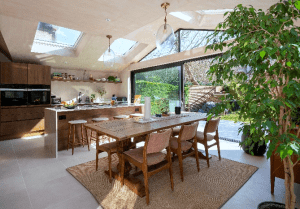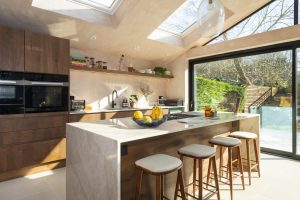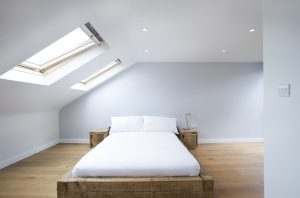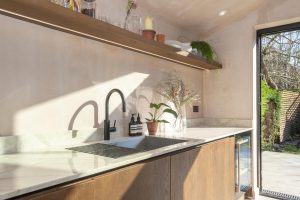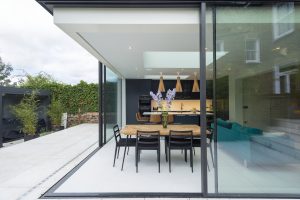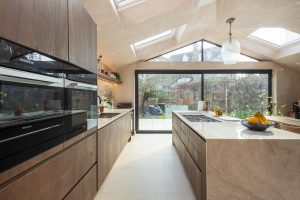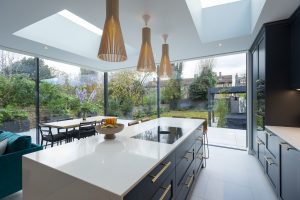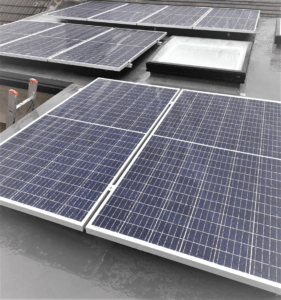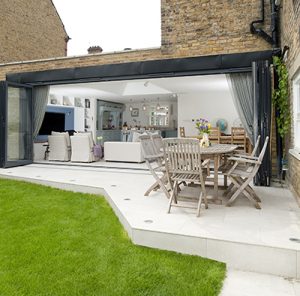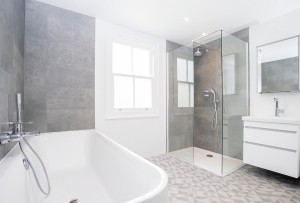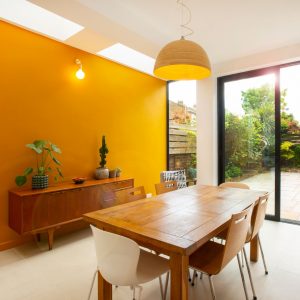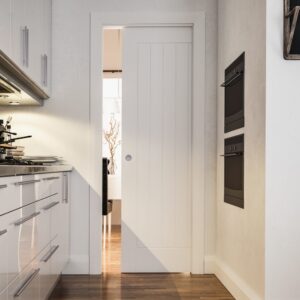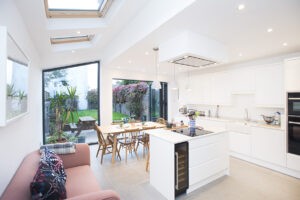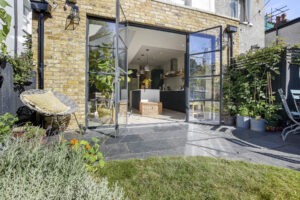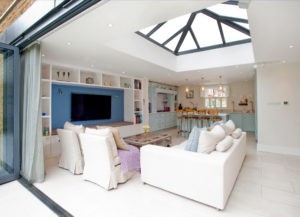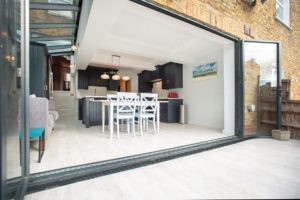An energy-efficient home offers lots of benefits beyond environmental impact. Reducing your energy usage can also greatly lower your household bills and significantly increase your home’s resale value. Prioritising energy efficiency in your home extension is therefore essential.
When it comes to energy conservation, it’s crucial to think in the long term. Although it may require a higher investment upfront, spending more money now will yield the best outcome in the future, ultimately saving you a substantial amount over time.
Here are some of the key areas to cover when building your home extension, such as heating, insulation and glazing.
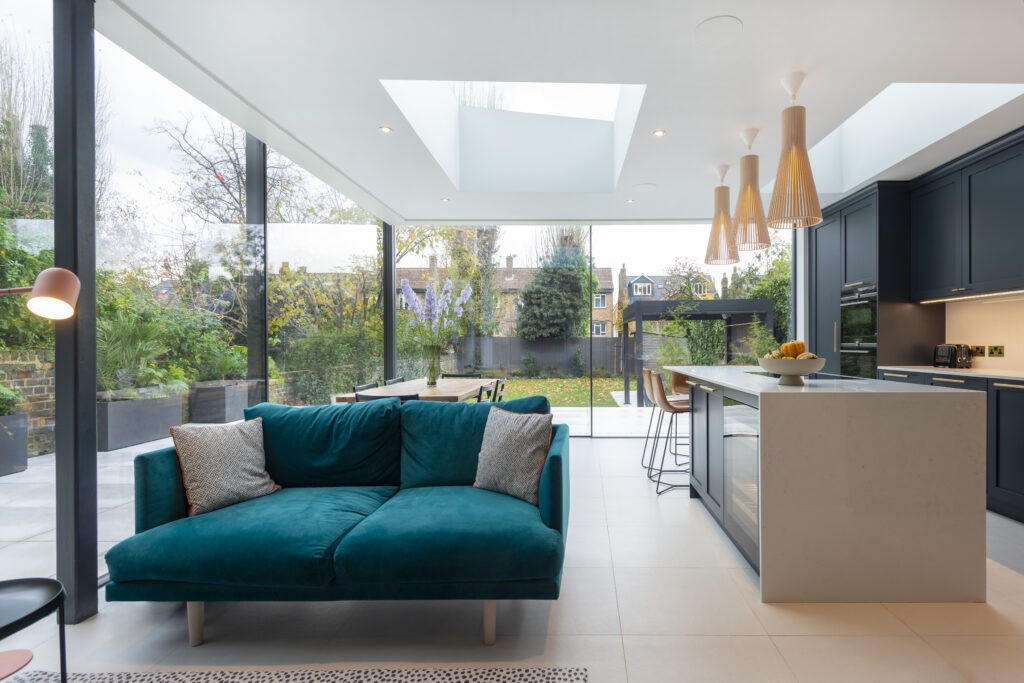
Insulating Materials
Effective energy consumption begins with the choice of building materials. The materials in your home play a crucial role in reducing energy consumption from the outset.
Opt for higher density materials like bricks, concrete and stone to enhance wall insulation. These materials not only absorb and store heat from natural sources like the sun, but also minimise heat transfer, thereby stabilising internal temperatures. Concrete works especially well with its significant thermal mass reducing energy usage by a potentially 30%.
In addition, consider the insulation of your floors. Using rigid foam like Polyisocyanurate will provide comprehensive insulation from the ground up, as well as providing moisture resistance and strength.
Upgrade your Boiler
If you’re extension involves substantial growth to your home, you might want to consider upgrading your boiler as your current one may not be able to cope with heating any additional space. Getting a new boiler is advisable as modern models are designed to be more energy efficient, effectively heating your expanded home at a lower cost. This upgrade can prove beneficial even if you’re not expanding the physical footprint of your home.
Avoid the temptation to cut costs with electric heaters at this stage. While initially cheaper, electric heaters are much less effective than modern boilers and will likely lead to higher long-term expenses. Investing in a new boiler ensures better energy efficiency and cost savings over time.
Choose the Right Heating
Creating an energy efficient home doesn’t mean compromising on heating. There are heating options that can be highly effective while still saving you money.
Underfloor heating is an excellent choice as the primary heating source in your home. It distributes heat evenly, offering potential savings of up to 50% compared to central or electric heating systems.
If you do choose to install radiators, carefully consider their positioning. Putting them near larger items can cause heat absorption, while drafts can lead to energy wastage. Make sure to seal all unwanted gaps to maximise efficiency. Installing individual room thermostats also allows precise control over radiator temperatures, further enhancing energy savings.
Invest in Quality Glazing
Quality glazing plays a crucial role in energy conservation within your home. Without proper protection and quality materials, as much as 40% of your home’s heat could escape through your windows and doors. It is therefore essential to invest in superior glazing options, such as double or triple glazing, as well as glass with a low U-value (indicating minimal heat loss). This will help regulate the temperature in your home year-round, keeping it cooler in summer and warmer in winter. Moreover, quality glazing provides UV protection for your furniture and interior, enhances soundproofing and bolsters home security.
To maximise efficiency, ensure all gaps are properly sealed. Conducting an air-tightness test beforehand can pinpoint areas needing attention, ensuring your home remains energy-efficient and comfortable.
Get Creative with Glazing
Innovative use of glazing products along with strategic placement is a fantastic way of enhancing the energy efficiency of your home. Focus on maximising natural light through expansive windows, skylights and stylish glazing features like sliding or bifold doors. Position larger windows facing south, east or west to harness sunlight effectively. Additionally, consider aligning windows across from each other to facilitate cross ventilation, particularly beneficial during warmer months.
Getting creative with your glazing can help regulate the temperature in your home and increase natural light, decreasing the need for artificial light and thereby lowering overall energy consumption.
Lighting
Although slightly more expensive, LED lights offer unparalleled energy efficiency in artificial lighting. Unlike traditional halogen bulbs, LEDs have a long life span and greater durability, leading to potential yearly savings of up to 36% on lighting bills.
Strategic placement of these bulbs alongside natural light, as well as choosing the right colour temperature, can significantly reduce your energy consumption, while enhancing the overall look and feel of your home’s interior.
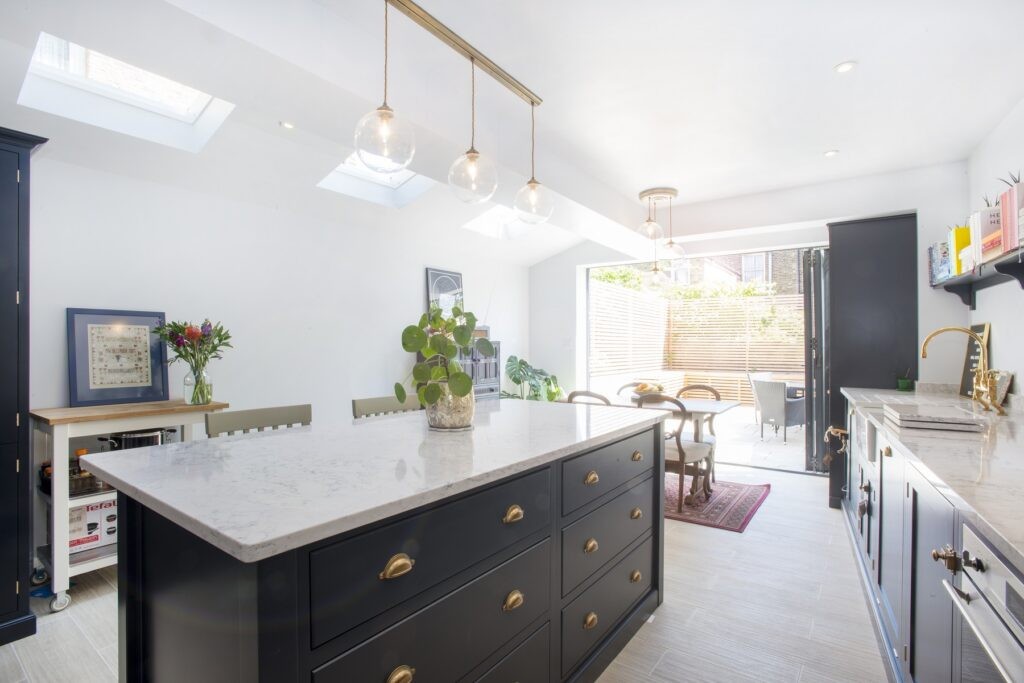
Energy Efficient Appliances
Home appliances and electronic devises can collectively account for up to 60% of your household’s energy consumption. Therefore, optimising energy usage in this area is crucial. Look for appliances with high Energy Star ratings, such as dishwashers, fridges, washing machines and dryers. Investing in energy-efficient appliances not only reduces your immediate energy usage but also enhances your home’s resale value over time.
Solar Power
If you’re looking for a long-term upgrade to your home, consider integrating solar panels as an eco-friendly solution to power lighting, heating systems, appliances and water. Extensions provide an ideal opportunity to incorporate solar panels without compromising on space, maximising the utility of every square foot of your property.
Solar panels not only offer substantial savings on energy bills but also boast a lifespan of up to 25 years, making them a fantastic investment that increase your home’s resale value.
Water Conservation
Water conservation is a vital aspect of sustainability and reducing utility costs, often overlooked in home improvements. One effective approach is to install low-flow fixtures to bathroom and kitchen taps, which can significantly reduce water consumption. Additionally, implementing a rainwater harvesting system to collect and store water for landscaping purposes further reduces reliance on water supplies.
The key thing to remember when it comes to enhancing the energy efficiency of your home is that it’s an investment. Allocating resources wisely now can lead to substantial saving and benefits in the future. Thinking about extending? Need some advise? Contact Build Team today and embark on a seamless journey to transform your home with our expertly guided and comprehensive extension services.





